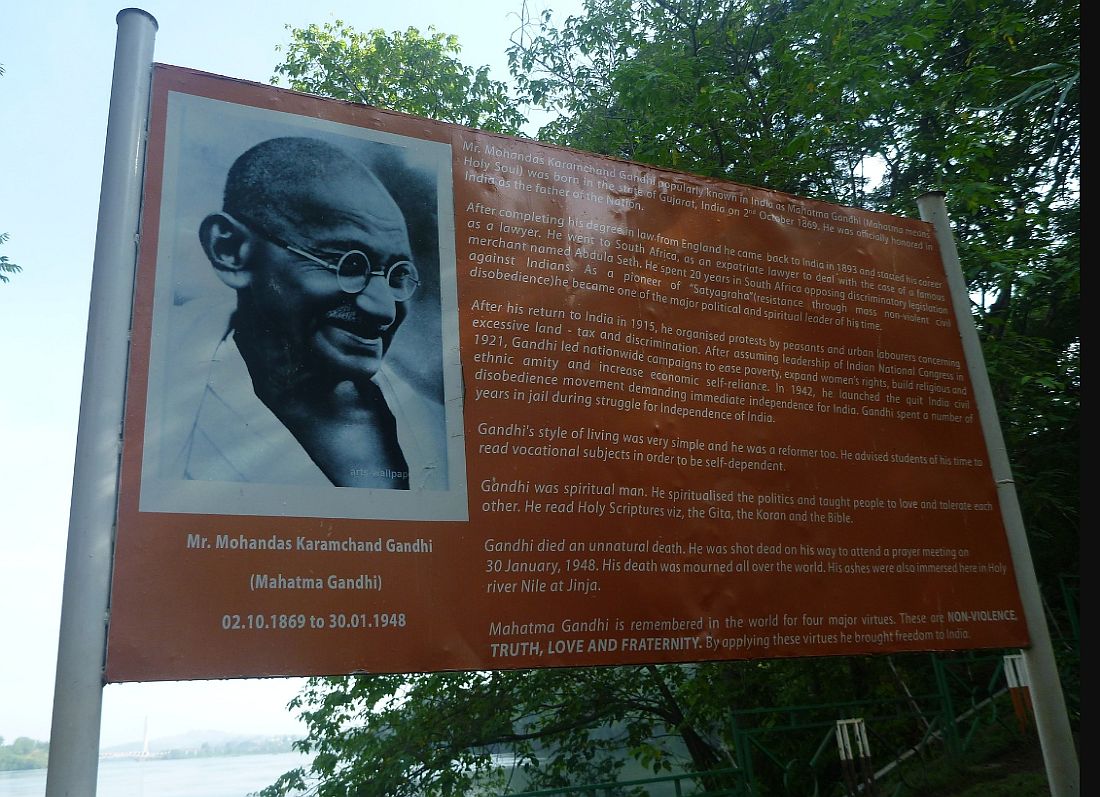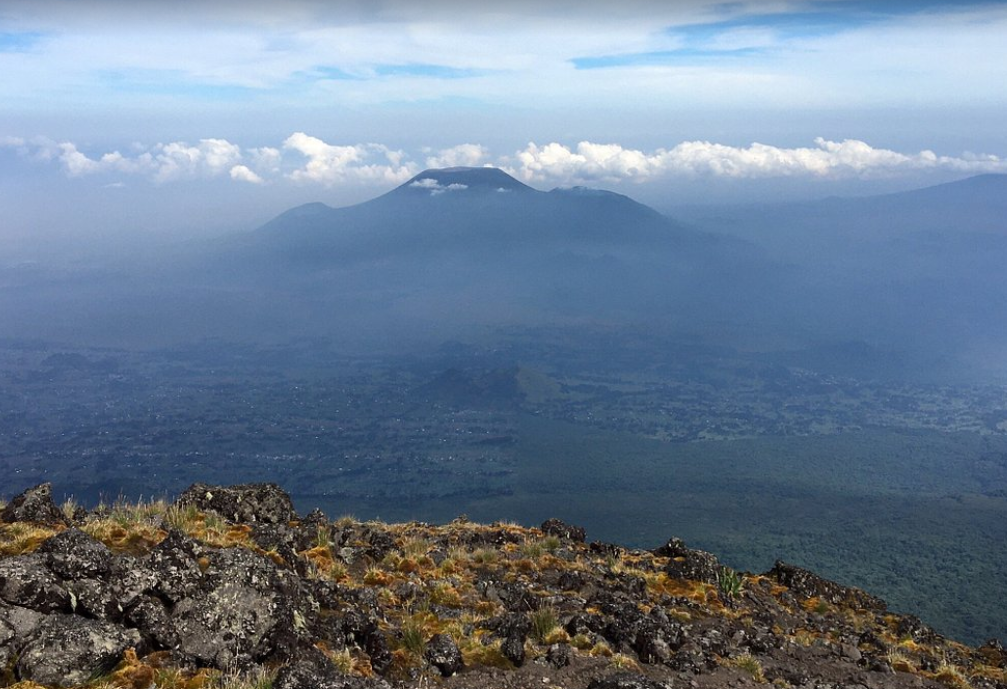The Mahatma Gandhi Monument at the Source of the Nile in Jinja
The Mahatma Gandhi Monument at the Source of the Nile in Jinja, Uganda, stands as a significant symbol of international unity and peace.
This monument not only commemorates the life and legacy of Mahatma Gandhi but also highlights the historical and cultural ties between India and Uganda. Furthermore, situated at one of the most iconic locations in East Africa, the monument serves as a reminder of Gandhi’s enduring influence across the globe.
Mahatma Gandhi

Mahatma Gandhi, often called the Father of the Nation in India, gained worldwide renown for his non-violent struggle for India’s independence. Moreover, his influence extends far beyond India, reaching various parts of the globe, including Uganda. Additionally, Gandhi’s philosophy and the Indian diaspora in East Africa connect him to Uganda. This article explores the significance of Mahatma Gandhi’s legacy in Uganda, covering key events, memorials, and his impact on Ugandan society..
Historical Background
Mahatma Gandhi’s presence in East Africa dates back to the early 20th century. Although he never visited Uganda, his principles and teachings deeply influenced the Indian community there. Many Indians in Uganda were followers of Gandhi and played a significant role in the country’s socio-economic development.
Gandhi’s Influence on the Indian Community in Uganda
-
During British colonial rule, a large number of Indians migrated to East Africa, including Uganda, to work on the construction of the Uganda Railway and in trade. Moreover, Gandhi’s philosophy of non-violence and civil disobedience resonated with these Indian settlers, who often faced discrimination and hardship. Additionally, Gandhi’s ideas provided a framework for peaceful resistance and self-reliance, which were crucial for the Indian community’s survival and prosperity in a foreign land.
Memorials and Commemorations
In Uganda, Mahatma Gandhi is commemorated in various ways, reflecting his enduring legacy. For instance, one of the most significant memorials is the Mahatma Gandhi Memorial on the banks of the River Nile in Jinja. Furthermore, it is said that some of Gandhi’s ashes were scattered in the Nile, symbolizing his universal appeal and connection to the river, which is a lifeline for many African countries.
Mahatma Gandhi Memorial
Located at the source of the Nile in Jinja, this memorial is a popular tourist attraction. It features a bust of Gandhi and plaques detailing his life and philosophy. The site attracts both locals and international visitors who come to pay their respects and reflect on Gandhi’s teachings.
The Monument
The Mahatma Gandhi Monument in Jinja was erected to honor Gandhi’s legacy and his influence on peace and non-violence. The monument is located at the Source of the Nile, a place of great natural beauty and historical significance.
- Design and Structure: The monument features a bronze bust of Mahatma Gandhi set on a stone pedestal. The inscription on the pedestal highlights Gandhi’s contributions to humanity and his philosophy of non-violence. The serene surroundings of the Nile enhance the monument’s tranquility, making it a fitting tribute to Gandhi’s peaceful ideals.
- Symbolic Significance: The scattering of Gandhi’s ashes in the Nile River symbolizes his eternal journey and the spread of his message across continents. The Nile, being a source of life and sustenance for many, aligns with Gandhi’s vision of universal harmony and brotherhood.
The Inauguration
Dignitaries from India and Uganda inaugurated the monument in a ceremony that reflected the deep-rooted connections between the two countries. Speeches at the event highlighted Gandhi’s impact on the world and his enduring legacy in promoting peace and non-violence
Tourism and Cultural Impact
The Mahatma Gandhi Monument has become a significant tourist attraction in Jinja, drawing visitors from around the world. It serves as a place for reflection and education, where people can learn about Gandhi’s life and philosophy.
- Visitor Experience: Visitor Experience: Tourists visiting the monument often feel struck by the peaceful ambiance and the profound historical significance of the site. The monument offers a space for contemplation and learning, with plaques and informational boards detailing Gandhi’s contributions to global peace.
- Cultural Exchange: The monument fosters cultural exchange and understanding between India and Uganda. It is a testament to the shared values of peace, tolerance, and mutual respect. Events and activities organized around the monument often include cultural performances and educational programs that promote Gandhi’s ideals.
The Mahatma Gandhi Monument at the Source of the Nile in Jinja stands as a powerful symbol of Gandhi’s lasting legacy. It reminds us of his commitment to non-violence, peace, and the interconnectedness of all humanity. As a place of historical and cultural importance, the monument continues to inspire visitors and promote the values Gandhi championed throughout his life.
In visiting this monument, we are reminded of the enduring relevance of Gandhi’s message and the importance of striving for a world characterized by peace, justice, and harmony. The Mahatma Gandhi Monument at the Source of the Nile is not just a tribute to a great leader, but also a beacon of hope for future generations.
2. Annual Commemorations: Every year, various events are organized to commemorate Gandhi’s birthday on October 2nd, known as the International Day of Non-Violence. These events often include seminars, cultural programs, and community service activities inspired by Gandhi’s ideals.
Gandhi’s Philosophical Impact on Uganda
Gandhi’s principles of non-violence, truth, and civil disobedience have had a lasting impact on Uganda’s socio-political landscape. Moreover, his teachings influenced prominent Ugandan leaders and activists who sought to address issues of injustice and inequality.
- Influence on Ugandan Leaders: Firstly, many Ugandan leaders, including those involved in the struggle for independence, drew inspiration from Gandhi’s methods. His emphasis on peaceful resistance and dialogue resonated with Ugandans who sought to end colonial rule and build a just society. Consequently, these leaders adopted Gandhi’s strategies to achieve their goals without resorting to violence.
- Civil Society and Social Movements: Furthermore, Gandhi’s philosophy continues to inspire civil society organizations and social movements in Uganda. These groups often adopt non-violent methods to advocate for human rights, social justice, and environmental sustainability, echoing Gandhi’s commitment to these causes. As a result, Gandhi’s legacy is evident in the ongoing efforts to promote peace and justice in Uganda.
In addition, Gandhi’s teachings have permeated various aspects of Ugandan society, encouraging individuals and groups to pursue their objectives through peaceful means. This influence is particularly visible in the work of numerous non-governmental organizations (NGOs) that strive to create positive change within communities.
In celebrating Gandhi’s connection to Uganda, we are reminded of the power of his message and the enduring impact of his life and work. Moreover, his legacy serves as a beacon of hope and a call to action for individuals and communities striving for a more just and peaceful world.






